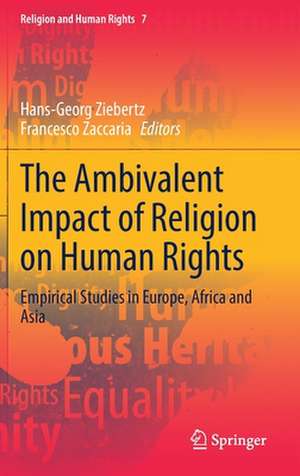The Ambivalent Impact of Religion on Human Rights: Empirical Studies in Europe, Africa and Asia: Religion and Human Rights, cartea 7
Editat de Hans-Georg Ziebertz, Francesco Zaccariaen Limba Engleză Hardback – 16 noi 2021
Studies are comparative on multiple levels because of the many religious groups and countries. The studies take into account personal, religious and socio-cultural differences, showing the ambivalent role of religion in the striving to make the world safer, more democratic, just, and compassionate thru human rights. This text appeals to students and researchers.
| Toate formatele și edițiile | Preț | Express |
|---|---|---|
| Paperback (1) | 892.90 lei 6-8 săpt. | |
| Springer International Publishing – 17 noi 2022 | 892.90 lei 6-8 săpt. | |
| Hardback (1) | 749.10 lei 38-44 zile | |
| Springer International Publishing – 16 noi 2021 | 749.10 lei 38-44 zile |
Preț: 749.10 lei
Preț vechi: 985.66 lei
-24% Nou
Puncte Express: 1124
Preț estimativ în valută:
143.34€ • 150.04$ • 119.30£
143.34€ • 150.04$ • 119.30£
Carte tipărită la comandă
Livrare economică 27 martie-02 aprilie
Preluare comenzi: 021 569.72.76
Specificații
ISBN-13: 9783030704032
ISBN-10: 3030704033
Pagini: 349
Ilustrații: VI, 349 p. 20 illus., 2 illus. in color.
Dimensiuni: 155 x 235 mm
Greutate: 0.67 kg
Ediția:1st ed. 2021
Editura: Springer International Publishing
Colecția Springer
Seria Religion and Human Rights
Locul publicării:Cham, Switzerland
ISBN-10: 3030704033
Pagini: 349
Ilustrații: VI, 349 p. 20 illus., 2 illus. in color.
Dimensiuni: 155 x 235 mm
Greutate: 0.67 kg
Ediția:1st ed. 2021
Editura: Springer International Publishing
Colecția Springer
Seria Religion and Human Rights
Locul publicării:Cham, Switzerland
Cuprins
Preface.- Chapter 1. Religion and Human Rights – Introductory remarks in a complex relationship.- Part 1. Europe.- Chapter 2. The impact of religion on human rights in Italy. An empirical research among secondary school students.- Chapter 3. Religion and the rights of refugees: An empirical enquiry among adolescents in England and Wales.- Chapter 4. New Atheism as a predictor of human rights attitudes among Norwegian youth.- Chapter 5. Religion and Socio-Economic Human Rights in Post-Communist Countries: The Cases of Poland and Lithuania.- Chapter 6. How young Muslims and Christians structure Human Rights. An empirical study in Germany.- Part 2. Africa.- Chapter 7. Exploring Attitudes towards Human Rights and the Religiosity of Adolescents in Nigeria.- Chapter 8. Religious and human rights attitudes of the youth of South Africa.- Chapter 9. Impact of religion(s) on youths’ attitudes towards Human rights in Tanzania.- Part 3. Asia.- Chapter 10. Predictors of Human Rights Attitude and Activism in the Multi-religious Context of Indian Democracy: Educational Implications.- Chapter 11. Attitude toward human rights: A study among young people in Pakistan.- Chapter 12. The Impact of Empathy and Religion on Human Rights among youth in Palestine.- Index.
Notă biografică
Prof. Dr. Hans-Georg Ziebertz is professor in practical theology, University of Würzburg, Germany. He is coordinator of the international research project "Religion and Human Rights", and has many publications on these issues.
Dr. Francesco Zaccaria is in the Apulian Theological Faculty. He works on practical theology.
Dr. Francesco Zaccaria is in the Apulian Theological Faculty. He works on practical theology.
Textul de pe ultima copertă
This volume presents the most recent joint study of the research group Religion and Human Rights. This text is comprised of studies carried out in twelve countries and divided into three parts according to their respective tree continents. Almost 10,000 youths have participated and all chapters deal with the question of whether and to what extent religious or worldview convictions hinder or favor the support of human rights.
Studies are comparative on multiple levels because of the many religious groups and countries. The studies take into account personal, religious and socio-cultural differences, showing the ambivalent role of religion in the striving to make the world safer, more democratic, just, and compassionate thru human rights. This text appeals to students and researchers.
Studies are comparative on multiple levels because of the many religious groups and countries. The studies take into account personal, religious and socio-cultural differences, showing the ambivalent role of religion in the striving to make the world safer, more democratic, just, and compassionate thru human rights. This text appeals to students and researchers.
Caracteristici
Reflects on factors that either induce or reduce agreement with human rights issues Offers international comparative empirical research on human rights covering three continents focusing on youths Uniquely includes empirical research on the acceptance, perception and legitimation of human rights by people from different religious and cultural backgrounds Tests for inter-individual differences regarding human rights on religious grounds, while controlling for other characteristics









